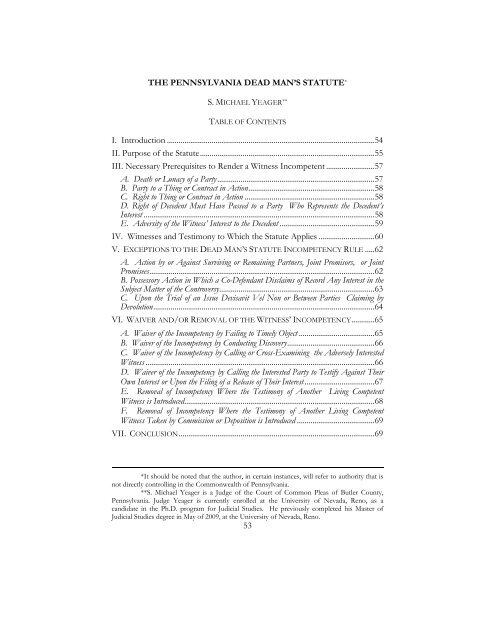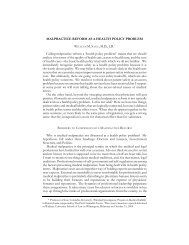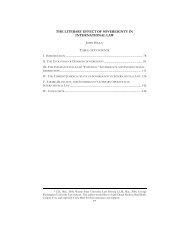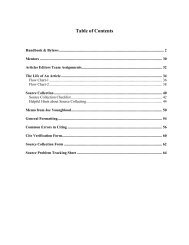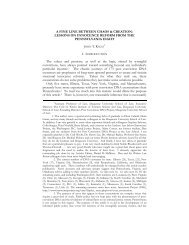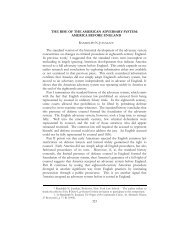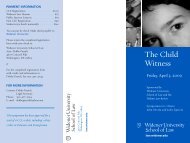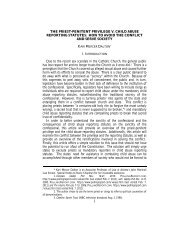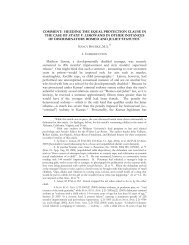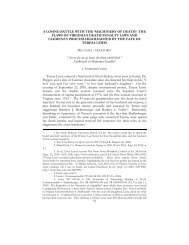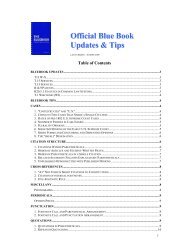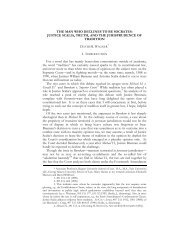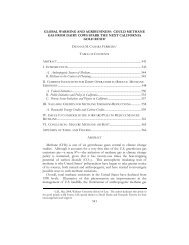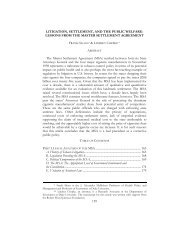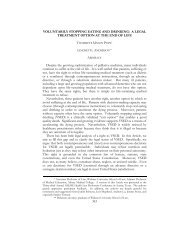The Pennsylvania Dead Man's Statute - Widener Law Review
The Pennsylvania Dead Man's Statute - Widener Law Review
The Pennsylvania Dead Man's Statute - Widener Law Review
Create successful ePaper yourself
Turn your PDF publications into a flip-book with our unique Google optimized e-Paper software.
THE PENNSYLVANIA DEAD MAN’S STATUTE *<br />
S. MICHAEL YEAGER * *<br />
TABLE OF CONTENTS<br />
I. Introduction ...........................................................................................................54<br />
II. Purpose of the <strong>Statute</strong> ..........................................................................................55<br />
III. Necessary Prerequisites to Render a Witness Incompetent .........................57<br />
A. Death or Lunacy of a Party .................................................................................57<br />
B. Party to a Thing or Contract in Action .................................................................58<br />
C. Right to Thing or Contract in Action ...................................................................58<br />
D. Right of Decedent Must Have Passed to a Party Who Represents the Decedent’s<br />
Interest .......................................................................................................................58<br />
E. Adversity of the Witness’ Interest to the Decedent .................................................59<br />
IV. Witnesses and Testimony to Which the <strong>Statute</strong> Applies .............................60<br />
V. EXCEPTIONS TO THE DEAD MAN’S STATUTE INCOMPETENCY RULE .....62<br />
A. Action by or Against Surviving or Remaining Partners, Joint Promisors, or Joint<br />
Promisees ....................................................................................................................62<br />
B. Possessory Action in Which a Co-Defendant Disclaims of Record Any Interest in the<br />
Subject Matter of the Controversy ................................................................................63<br />
C. Upon the Trial of an Issue Devisavit Vel Non or Between Parties Claiming by<br />
Devolution ..................................................................................................................64<br />
VI. WAIVER AND/OR REMOVAL OF THE WITNESS’ INCOMPETENCY ............65<br />
A. Waiver of the Incompetency by Failing to Timely Object .......................................65<br />
B. Waiver of the Incompetency by Conducting Discovery .............................................66<br />
C. Waiver of the Incompetency by Calling or Cross-Examining the Adversely Interested<br />
Witness ......................................................................................................................66<br />
D. Waiver of the Incompetency by Calling the Interested Party to Testify Against <strong>The</strong>ir<br />
Own Interest or Upon the Filing of a Release of <strong>The</strong>ir Interest ....................................67<br />
E. Removal of Incompetency Where the Testimony of Another Living Competent<br />
Witness is Introduced ..................................................................................................68<br />
F. Removal of Incompetency Where the Testimony of Another Living Competent<br />
Witness Taken by Commission or Deposition is Introduced ........................................69<br />
VII. CONCLUSION .....................................................................................................69<br />
*It should be noted that the author, in certain instances, will refer to authority that is<br />
not directly controlling in the Commonwealth of <strong>Pennsylvania</strong>.<br />
**S. Michael Yeager is a Judge of the Court of Common Pleas of Butler County,<br />
<strong>Pennsylvania</strong>. Judge Yeager is currently enrolled at the University of Nevada, Reno, as a<br />
candidate in the Ph.D. program for Judicial Studies. He previously completed his Master of<br />
Judicial Studies degree in May of 2009, at the University of Nevada, Reno.<br />
53
54 <strong>Widener</strong> <strong>Law</strong> <strong>Review</strong> [Vol. 18: 53<br />
I. INTRODUCTION<br />
<strong>The</strong> trepidation about the <strong>Pennsylvania</strong> <strong>Dead</strong> Man’s <strong>Statute</strong> that I had<br />
always experienced as a practicing attorney and still experience as a judge was<br />
substantially increased upon my receipt of a memorandum dated May 23,<br />
2005, from the President Judge of the county in which I preside. As a result<br />
of this correspondence, “informal division assignments effective January 1,<br />
2006” were implemented. 1 I was assigned to handle forty percent of the Civil<br />
Division (excluding Family Court), including all license suspensions, and all<br />
estate and trust matters in the Orphans’ Court Division.<br />
Through my previous experience, I was well aware that of all the areas of<br />
law, the <strong>Dead</strong> Man’s <strong>Statute</strong> is most likely to apply in estate matters because<br />
many states have specifically enacted such statutes to handle claims against an<br />
estate. 2 In <strong>Pennsylvania</strong>, lawyers and judges have struggled with “<strong>The</strong> <strong>Dead</strong><br />
Man’s Act” since its inception. 3<br />
<strong>The</strong> <strong>Dead</strong> Man’s <strong>Statute</strong> in <strong>Pennsylvania</strong> consists of a single sentence<br />
containing more than three hundred words, constructed as a triple negative,<br />
delineating when a surviving or remaining party to a “thing or contract in<br />
action” may or may not testify, and is a part of the substantive law of the<br />
Commonwealth. 4 It “applies to civil proceedings before any tribunal in the<br />
Commonwealth,” be it the “register of wills, auditor, arbitrator, referee, court<br />
of common pleas, orphans’ court division of the same, the Superior Court, the<br />
Supreme Court, or any other tribunal created by law to try causes of action<br />
between contesting parties.” 5 <strong>The</strong> <strong>Statute</strong>, entitled “Surviving party as a<br />
witness, in case of death, mental incapacity, etc.,” reads as follows:<br />
Except as otherwise provided in this subchapter, in any civil action or<br />
proceeding, where any party to a thing or contract in action is dead, or has been<br />
adjudged a lunatic and his right thereto or therein has passed, either by his own<br />
act or by the act of the law, to a party on the record who represents his interest<br />
in the subject in controversy, neither any surviving or remaining party to such<br />
thing or contract, nor any other person whose interest shall be adverse to the<br />
said right of such deceased or lunatic party, shall be a competent witness to any<br />
matter occurring before the death of said party or the adjudication of his lunacy,<br />
unless the action or proceeding is by or against the surviving or remaining<br />
partners, joint promisors or joint promisees, of such deceased or lunatic party,<br />
and the matter occurred between such surviving or remaining partners, joint<br />
promisors or joint promisees and the other party on the record, or between<br />
such surviving or remaining partners, promisors or promisees and the person<br />
1. Memorandum from Thomas J. Doerr, President Judge, Butler Cnty. Court of<br />
Common Pleas, to Judge George H. Hancher, Judge Marilyn J. Horan, Judge William R. Shaffer,<br />
and Judge S. Michael Yeager (May 23, 2005) (on file with the <strong>Widener</strong> <strong>Law</strong> <strong>Review</strong>).<br />
2. Steve Planchon, Comment, <strong>The</strong> Application of the <strong>Dead</strong> Man’s <strong>Statute</strong>s in Family <strong>Law</strong>,<br />
16 J. AM. ACAD. MATRIMONIAL L. 561, 566 (2000).<br />
3. Burton R. Laub, & John M. McLaughlin, <strong>The</strong> <strong>Dead</strong> Man’s Act, in 3 PENNSYLVANIA<br />
KEYSTONE LAWYER’S DESK LIBRARY OF PRACTICE 5, 7 (W. Edward Sell ed., Supp. 2011). <strong>The</strong><br />
<strong>Dead</strong> Man’s Act can be found in Section 5, Clause (e) of the Evidence Act of May 23, 1887. Id.<br />
4. 42 PA. CONS. STAT. ANN. § 5930 (West 2000).<br />
5. 53 PA. L. ENCY. 2D Witnesses § 62 (2d ed. 2006).
2012] <strong>Pennsylvania</strong> <strong>Dead</strong> Man’s <strong>Statute</strong> 55<br />
having an interest adverse to them, in which case any person may testify to such<br />
matters; or, unless the action is a possessory action against several defendants,<br />
and one or more of said defendants disclaims of record any title to the premises<br />
in controversy at the time the suit was brought and also pays into court the<br />
costs accrued at the time of his disclaimer, or gives security therefor as the court<br />
in its discretion may direct, in which case such disclaiming defendant shall be a<br />
fully competent witness; or, unless the issue or inquiry be devisavit vel non, or<br />
be any other issue or inquiry respecting the property of a deceased owner, and<br />
the controversy is between parties respectively claiming such property by<br />
devolution on the death of such owner, in which case all persons shall be fully<br />
competent witnesses. 6<br />
<strong>Pennsylvania</strong>’s <strong>Dead</strong> Man’s <strong>Statute</strong> is in contravention of the general<br />
statutory rule embodied in title 42, section 5921 of the <strong>Pennsylvania</strong><br />
Consolidated <strong>Statute</strong>s (any interest in a civil matter does not render a person<br />
incompetent to be a witness in the case), and is likewise an exception to Rule<br />
601 of the <strong>Pennsylvania</strong> Rules of Evidence (the presumption that all witnesses<br />
are competent to testify). 7 In fact, the Comment to Rule 601 acknowledges<br />
that “<strong>Pennsylvania</strong> statutory law provides several instances in which witnesses<br />
are incompetent” with title 42, section 5930 of the <strong>Pennsylvania</strong> Consolidated<br />
<strong>Statute</strong>s being one of those circumstances, 8 as the Rules of Evidence cannot<br />
abrogate statutes. <strong>The</strong> <strong>Statute</strong> applies to any civil action or proceeding where<br />
any party is dead, or has been judicially determined to be a lunatic, and subject<br />
to certain exceptions, renders any remaining party to the matter at issue in the<br />
action or any witness whose interest is adverse to the protected party<br />
incompetent to testify regarding any matter occurring before the death of the<br />
decedent or adjudication of lunacy, as the case may be. 9<br />
II. PURPOSE OF THE STATUTE<br />
Under the common law, parties and interested persons were not competent<br />
witnesses, no matter the purpose. 10 <strong>The</strong> courts devised the <strong>Dead</strong> Man’s<br />
<strong>Statute</strong> because, in their collective minds, “the fallen nature of man was<br />
incapable of the truth where self interest was involved.” 11 Those same courts,<br />
however, were not concerned that the rule could also inhibit truth, thus giving<br />
unjust individuals the chance to avoid the payment of proper indebtednesses. 12<br />
In response to these judicial concerns, “the legislature sought to prevent the<br />
injustice that might [otherwise] flow from permitting a surviving, adverse party<br />
to give testimony that is favorable to himself and unfavorable to the<br />
decedent’s interest, but which the decedent’s representative is in no position to<br />
(1879)).<br />
6. 42 PA. CONS. STAT. ANN. § 5930 (emphasis added).<br />
7. Id. § 5921; PA. R. EVID. 601(a).<br />
8. PA. R. EVID. 601 committee’s cmt. (2007).<br />
9. 42 PA. CONS. STAT. ANN. § 5930.<br />
10. Laub & McLaughlin, supra note 3, at 8 (citing Hess v. Gourley, 89 Pa. 195, 198<br />
11. Laub & McLaughlin, supra note 3, at 8.<br />
12. Id.
56 <strong>Widener</strong> <strong>Law</strong> <strong>Review</strong> [Vol. 18: 53<br />
rebut.” 13 <strong>The</strong> testimony is rejected because of the incompetency of the<br />
witness, not the testimony itself; the testimony may be completely relevant, yet<br />
inadmissible. 14 As stated by the Indiana Court of Appeals, the premise behind<br />
that State’s <strong>Dead</strong> Man’s Act is, quite succinctly, “when the lips of one party . . .<br />
are closed by death, the lips of the other party are closed by law.” 15<br />
In order to ensure a fair trial when one of the parties is deceased or has<br />
been adjudged a lunatic, and is thus unable to testify on his or her own behalf,<br />
the <strong>Dead</strong> Man’s <strong>Statute</strong> protects that party’s estate from fraudulent claims and<br />
equalizes the respective positions of the parties relative to the presentation of<br />
testimony. 16 <strong>The</strong> underlying purposes of the <strong>Dead</strong> Man’s <strong>Statute</strong> are equality,<br />
the prevention of false testimony, 17 and to put the surviving party on equal<br />
ground with the protected party’s representative with regards to matters that<br />
occurred during the decedent’s lifetime or prior to an adjudication of lunacy. 18<br />
By prohibiting a person from testifying as a witness to establish his or her own<br />
claim or defense against the estate of the protected party which originated<br />
prior to death or adjudged lunacy, the statute effectively renders incompetent<br />
an interested person’s testimony regarding conversations and events that<br />
occurred in the presence of the deceased or adjudged lunatic. 19<br />
It is of interest to note that pursuant to Federal Rule of Evidence 601,<br />
“[e]very person is competent to be a witness except as otherwise provided in<br />
these rules.” 20 <strong>The</strong> Advisory Committee’s Note on Rule 601 states: “<strong>The</strong><br />
<strong>Dead</strong> Man’s Acts are surviving traces of the common law disqualification of<br />
parties and interested persons. <strong>The</strong>y exist in variety too great to convey<br />
conviction of their wisdom and effectiveness. <strong>The</strong>se rules contain no<br />
provision of this kind.” 21<br />
Federal Rule of Evidence 601 continues: “However, in civil actions and<br />
proceedings, with respect to an element of a claim or defense as to which State<br />
law supplies the rule of decision, the competency of a witness shall be<br />
determined in accordance with State law.” 22 Accordingly, state <strong>Dead</strong> Man’s<br />
<strong>Statute</strong>s are applicable in diversity actions, 23 but not in federal question cases. 24<br />
Competency is the general rule, and the <strong>Dead</strong> Man’s <strong>Statute</strong> is a limited<br />
exception that is to be narrowly construed in its application by the courts. 25 It<br />
should not be extended by implication or to cases not strictly within the terms<br />
13. Schroeder v. Jaquiss, 861 A.2d 885, 889 (Pa. 2004).<br />
14. 53 PA. L. ENCY., supra note 5, at § 61.<br />
15. Satterthwaite v. Estate of Satterthwaite, 420 N.E.2d 287, 289 (Ind. Ct. App. 1981).<br />
16. See Ruback v. Doss, 807 N.E.2d 1019, 1022 (Ill. App. Ct. 2004).<br />
17.See Montgomery Cnty. v. Herlihy, 575 A.2d 784, 789-90 (Md. Ct. Spec. App. 1990).<br />
18. J.M. Corp. v. Roberson, 749 N.E.2d 567, 571 (Ind. Ct. App. 2001).<br />
19. Estate of Deskins v. Deskins, 471 N.E.2d 1018, 1025 (Ill. App. Ct. 1984).<br />
20. FED. R. EVID. 601.<br />
21. FED. R. EVID. 601 advisory committee’s note.<br />
22. FED. R. EVID. 601.<br />
23. E.g, Chase v. Groff, 410 F.Supp. 602, 608-09 (E.D. Pa. 1976), aff’d, 556 F.2d 565<br />
(3d Cir. 1977).<br />
24. Cf., United States v. Diehl, 460 F. Supp. 1282, 1289 (S.D. Tex. 1978), aff’d, 586<br />
F.2d 1080 (5th Cir. 1978).<br />
25. Germann v. Matriss, 260 A.2d 825, 838 (N.J. 1970).
2012] <strong>Pennsylvania</strong> <strong>Dead</strong> Man’s <strong>Statute</strong> 57<br />
of the statute. 26 Practitioners, however, believe that judges and/or arbitration<br />
panels often interpret the <strong>Statute</strong>’s reach as broader than it was intended<br />
because of the confusing language within the <strong>Statute</strong> itself. 27 <strong>The</strong><br />
<strong>Pennsylvania</strong> Superior Court has opined that, in criminal prosecutions, the<br />
<strong>Dead</strong> Man’s Act has no apparent basis for being imposed. 28<br />
III. NECESSARY PREREQUISITES TO RENDER A WITNESS INCOMPETENT<br />
Before a witness may be disqualified under the <strong>Dead</strong> Man’s <strong>Statute</strong>, six<br />
elements must exist. Although most of the literature describes only three<br />
necessary prerequisites, 29 the following delineation of six requirements is<br />
preferable for the purposes of clarity and completeness. <strong>The</strong> six elements are:<br />
(1) the deceased must have been a party to a thing or contract in his lifetime, (2)<br />
the thing or contract must be the subject of the controversy involved in the<br />
pending suit, (3) the deceased must have had an interest in the thing or contract,<br />
(4) the interest of the deceased must have passed, either by his own act or by<br />
the act of the law, to a party on the record in the pending suit who must<br />
represent such interest of the deceased in said suit, (5) the witness must have<br />
been the surviving party to such thing or contract or have an interest therein<br />
adverse to the interest of the deceased, and (6) the subject matter of the witness’<br />
proposed testimony must relate to matters occurring in the lifetime of the<br />
deceased. 30<br />
A. Death or Lunacy of a Party<br />
I hasten to point out that the <strong>Dead</strong> Man’s <strong>Statute</strong> applies also in cases<br />
where a party to a civil proceeding has been adjudged a lunatic. 31 As a<br />
practical matter, however, it appears that the <strong>Statute</strong> applies only when a party<br />
is deceased, because there is no provision under current law to adjudicate a<br />
person a lunatic. Current law permits the appointment of a guardian for an<br />
“incapacitated person;” however, the term “lunatic” is not referenced. 32 An<br />
adjudication of incompetency does not constitute an adjudication of lunacy<br />
and does not make the individual incompetent as a witness. 33<br />
In <strong>Pennsylvania</strong>,<br />
lunacy is an outdated legal criterion that is no longer adjudicated;<br />
consequently, this standard should be reconsidered by the Legislature. For<br />
this reason, I have referred to a deceased individual or decedent in the above<br />
referenced prerequisites and have omitted any reference to an adjudicated<br />
26. Germann, 260 A.2d at 838.<br />
27. See Terence P. Ruf, Jr., <strong>The</strong> Applicability of <strong>The</strong> <strong>Dead</strong> Man’s Act on Typical Litigation<br />
Matters, TERENCERUFLAW.COM, http://www.terenceruflaw.com/uploads/<strong>Dead</strong>_Mans_<br />
Article02.pdf (last visited December 20, 2011).<br />
28. Commonwealth v. DiCio, 275 A.2d 868, 870 (Pa. Super. Ct. 1971).<br />
29. E.g., id.<br />
30. Gelbarth v. Moore, 29 Del. Cnty. Rep. 68, 70-71 (Pa. Ct. Com. Pl. 1939).<br />
31. 42 PA. CONS. STAT. ANN. § 5930 (West 2000).<br />
32. 20 PA. CONS. STAT. ANN. § 5511 (West 2005).<br />
33. See Yacabonis v. Gilvickas, 101 A.2d 690, 692 (Pa. 1954).
58 <strong>Widener</strong> <strong>Law</strong> <strong>Review</strong> [Vol. 18: 53<br />
lunatic, although it is proper to substitute “adjudged a lunatic” for “deceased”<br />
in the six prerequisites, as well as throughout the paper.<br />
B. Party to a Thing or Contract in Action<br />
<strong>The</strong> <strong>Pennsylvania</strong> Supreme Court has held that the <strong>Dead</strong> Man’s <strong>Statute</strong><br />
applies to both contract actions and tort actions, being as the <strong>Statute</strong> makes no<br />
distinction regarding the types of civil cases to which it has applicability. 34<br />
Accordingly, the <strong>Dead</strong> Man’s <strong>Statute</strong> is operative in all types of civil cases.<br />
C. Right to Thing or Contract in Action<br />
In order for the <strong>Dead</strong> Man’s <strong>Statute</strong> to apply, the decedent must have had<br />
“an actual right or interest in the matter at issue, that is, an interest in the<br />
immediate result” of the litigation. 35 <strong>The</strong> burden of proving the interest of the<br />
decedent is upon the deceased party’s representative and requires only proof<br />
of a prima facie interest. 36 As stated above, the <strong>Statute</strong> is equally applicable in<br />
tort actions and is implemented even in cases where the plaintiff offers to limit<br />
his claim to the amount of liability insurance coverage and does not seek to<br />
obtain a deficiency judgment in excess thereof against the assets of the estate<br />
of the deceased defendant. 37<br />
D. Right of Decedent Must Have Passed to a Party<br />
Who Represents the Decedent’s Interest<br />
To create a bar to testimony by a person surviving the decedent under the<br />
<strong>Dead</strong> Man’s <strong>Statute</strong>, the decedent’s interest or right in the thing or contract in<br />
action must have passed to a party on the record that represents the decedent’s<br />
interest in the matter. 38 Generally, a decedent’s rights pass to his legal<br />
representative or heirs upon his death. 39 It is the legal representative or heir<br />
who is the party that may then assert the <strong>Dead</strong> Man’s <strong>Statute</strong> to protect the<br />
decedent’s estate. 40<br />
When a question arises regarding the validity of a transfer by the decedent<br />
prior to death, the court determines if a valid inter vivos transfer can be proven<br />
by independent evidence before it admits testimony by the purported donee. 41<br />
If the court establishes that a valid inter vivos transfer has occurred based upon<br />
such independent evidence, the donee, representing the interest of the<br />
deceased, is permitted to testify. 42 However, if the alleged donee cannot<br />
34. Irwin v. Nolde, 30 A. 246, 246 (Pa. 1894).<br />
35. In re Estate of Hall, 535 A.2d 47, 53 (Pa. 1987) (citation omitted).<br />
36. In re Estate of Rider, 409 A.2d 397, 399-400 (Pa. 1979).<br />
37. Lyons v. Estate of Bodek, 142 A.2d 199, 200 (Pa. 1958).<br />
38. Williams v. Lukas, 103 A.2d 675, 678 (Pa. 1954).<br />
39. See In re Estate of Cecchine, 485 A.2d 454, 457 (Pa. Super. Ct. 1984).<br />
40. See Weschler v. Carroll, 578 A.2d 13, 16-17 (Pa. Super. Ct. 1990).<br />
41. Friedman v. Kinnen, 305 A.2d 3, 4 (Pa. 1973).<br />
42. Id.
2012] <strong>Pennsylvania</strong> <strong>Dead</strong> Man’s <strong>Statute</strong> 59<br />
establish a prima facie gift by independent evidence, he will be deemed<br />
incompetent and thus not be permitted to testify. 43 If the gift is not prima<br />
facie valid, the right of the decedent passes to his estate, and, therefore, the<br />
alleged donee becomes an adverse party. 44 Should the donee establish a prima<br />
facie valid transfer or gift, any party with an interest adverse to the decedent’s<br />
transfer will be incompetent to testify. 45<br />
In a wrongful death action, the plaintiff is not suing for damages suffered<br />
by the decedent, and therefore is not representing the decedent’s interest;<br />
accordingly, the defendant tortfeasor is not barred by the <strong>Dead</strong> Man’s <strong>Statute</strong><br />
from testifying as to the circumstances of the accident. 46 However, a<br />
decedent’s interest passes to the personal representative of his estate for<br />
purposes of the survival action and the <strong>Statute</strong> thus applies to the survival<br />
action. 47 Notwithstanding the aforementioned, where the action involves<br />
claims under both the wrongful death and survival statutes, the <strong>Dead</strong> Man’s<br />
<strong>Statute</strong> is inapplicable, as it would be senseless to tell the jury to listen to the<br />
defendant tortfeasor in the wrongful death claim but not in the survival action<br />
claim. 48<br />
E. Adversity of the Witness’ Interest to the Decedent<br />
A witness’ interest must be adverse to that of the decedent in order for the<br />
witness to be incompetent under the <strong>Dead</strong> Man’s <strong>Statute</strong>. 49 As stated by the<br />
<strong>Pennsylvania</strong> Supreme Court, “[i]n order to be adverse the interest must be<br />
one from which the witness will either gain or lose as the direct legal operation<br />
and effect of the judgment.” 50 Additionally, the court has noted, “[t]he mere<br />
fact that a witness, for personal reasons, may be unfriendly to the decedent’s<br />
cause and partial to that of his adversary is wholly immaterial, for, while that<br />
circumstance may affect his credibility, it has nothing whatever to do with his<br />
competency.” 51 It is adverse interest, not adverse testimony, that disqualifies<br />
the proffered witness, 52 and it is the adversity of the witness’ interest at the<br />
time he or she is called to testify that is determinative of competency. 53 A<br />
witness who seeks to testify favorably to the interest of the decedent is<br />
deemed to be competent under the <strong>Statute</strong>. 54<br />
Questions regarding the existence of an adverse interest appear in situations<br />
where the parties have some type of relationship. <strong>The</strong> <strong>Pennsylvania</strong> Supreme<br />
43. Friedman, 305 A.2d at 4.<br />
44. In re Estate of Hendrickson, 130 A.2d 143, 147 (Pa. 1957).<br />
45. See Philo v. Rought, 123 A.2d 168, 170 (Pa. 1956).<br />
46. Dennick v. Scheiwer, 113 A.2d 318, 319 (Pa. 1955).<br />
47. Cf. Gibbs v. Herman, 714 A.2d 432, 436 (Pa. Super. Ct. 1998).<br />
48. Id.<br />
49. In re Estate of Hall, 535 A.2d 47, 53 (Pa. 1987).<br />
50. In re Estate of Gelb, 228 A.2d 367, 369 (Pa. 1967).<br />
51. Billow v. Billow, 61 A.2d 817, 819 (Pa. 1948) (citation omitted).<br />
52. In re Estate of Hall, 535 A.2d at 54 n.4 (citing In re Estate of Gelb, 228 A.2d at 369).<br />
53. See Estate of Kofsky, 409 A.2d 1358, 1359 (Pa. 1979).<br />
54. See Oliver v. Safe Deposit & Title Guar. Co., 173 A. 281, 283 (Pa. 1934).
60 <strong>Widener</strong> <strong>Law</strong> <strong>Review</strong> [Vol. 18: 53<br />
Court has reversed itself and now holds that the spouse of an incompetent<br />
witness is no longer rendered incompetent by the <strong>Dead</strong> Man’s <strong>Statute</strong>. 55 An<br />
agent or employee of an interested party who is disqualified under the <strong>Statute</strong><br />
is not likewise disqualified because of the employment or agency<br />
relationship. 56 Stockholders, as owners of a corporation, are disqualified by<br />
the <strong>Dead</strong> Man’s <strong>Statute</strong> if the corporation’s interest is adverse to that of the<br />
decedent’s estate, based upon the stockholders’ pecuniary interest. 57 However,<br />
the stockholder’s incompetency is removed if, after the action has been<br />
initiated, the stockholder has in good faith parted with the stock. 58 An officer<br />
of a corporation, if also a stockholder, is incompetent to testify due to an<br />
interest in the outcome of the litigation. 59 However, where an officer of a<br />
corporation is not a stockholder therein and not a party to the record, the<br />
officer is a competent witness under the <strong>Statute</strong> due to a lack of interest in the<br />
outcome of the litigation. 60 Officers, trustees, or members of charitable or<br />
religious organizations who have had dealings with an individual who<br />
subsequently passed away are competent to testify regarding conversations or<br />
transactions with such decedent, as they have no personal and/or private<br />
interest in the property of the organization. 61<br />
In family law, the <strong>Dead</strong> Man’s <strong>Statute</strong> is often implemented in the domain<br />
of common law marriages. By the very nature of such relationships, the<br />
testimony of the purported common law spouse is critical to establishing that<br />
a union in fact existed. Courts have repeatedly precluded such testimony<br />
when attempting to establish the status of a common law spouse in claims for<br />
a spousal elective share against the will of a decedent. This preclusion is based<br />
upon the principle that a common law marriage is a civil contract, and, as a<br />
result, the alleged spouse would be testifying to a contractual relationship<br />
between himself or herself and the decedent. 62 Likewise, testimony by a<br />
surviving spouse regarding a prenuptial or an antenuptial agreement is<br />
prohibited by the <strong>Statute</strong>, following the rationale of the common law marriage<br />
cases and viewing such agreements as contractual relationships that fall under<br />
the protection afforded by the <strong>Dead</strong> Man’s <strong>Statute</strong>. 63<br />
IV. WITNESSES AND TESTIMONY TO WHICH THE STATUTE APPLIES<br />
Two classes of witnesses are disqualified under the <strong>Dead</strong> Man’s <strong>Statute</strong>:<br />
surviving or remaining parties to a thing or contract in action or any other<br />
person whose interest is adverse to the right of a deceased party, and one<br />
55. Estate of Grossman, 406 A.2d 726, 729, 733 (Pa. 1979).<br />
56. See Visscher v. O’Brien, 418 A.2d 454, 458 (Pa. Super. Ct. 1980).<br />
57. See Pittsburgh No. 8 Coal Corp. v. Newcomer, 76 A.2d 371, 374 (Pa. 1950).<br />
58. See Searle v. First Nat’l Bank of Montrose, 2 Walk. 395, 395, 407-09 (Pa. 1885).<br />
59. See Royal Batting & Felting Co. v. Klein, 27 A.2d 539, 541 (Pa. Super. Ct. 1942).<br />
60. Philadelphia Ins. Co. v. Wash. Ins. Co., 23 Pa. 250, 254 (1854).<br />
61. See In re Groome’s Estate, 11 A.2d 271, 272, 273 (Pa. 1940); Sorg v. First Ger.<br />
Evangelical St. Paul’s Congregation, 63 Pa. 156, 162 (1869).<br />
62. O’Halloran v. Stauffer (In re Estate of Stauffer), 476 A.2d 354, 357 (Pa. 1984).<br />
63. In re Estate of Hartman, 582 A.2d 648, 652 (Pa. Super. Ct. 1990).
2012] <strong>Pennsylvania</strong> <strong>Dead</strong> Man’s <strong>Statute</strong> 61<br />
adjudged a lunatic. 64 Whether a witness is in fact competent under the <strong>Dead</strong><br />
Man’s <strong>Statute</strong> is “a preliminary question to be determined by the court on the<br />
law and facts.” 65 In this regard, the standard of review of a trial court’s<br />
evidentiary ruling is an abuse of discretion standard. 66 However, the<br />
<strong>Pennsylvania</strong> Supreme Court has opined that in these cases, as the evidentiary<br />
ruling turns on a question of law, its review is plenary. 67<br />
<strong>The</strong> <strong>Dead</strong> Man’s <strong>Statute</strong> applies solely to testimony; accordingly, the <strong>Statute</strong><br />
does not render incompetent written evidence presented by an adverse<br />
surviving party, 68 nor does it preclude the admission of written documents<br />
signed by the decedent before his death. 69 <strong>The</strong>refore, testimony offered only<br />
to authenticate documentary evidence is not rendered incompetent. 70 <strong>The</strong><br />
<strong>Statute</strong> is applicable, however, to all pre-death events and provides that the<br />
surviving or remaining party to a thing or contract in action, or any other party<br />
adversely interested, cannot testify to any matter occurring before the death of<br />
the other party thereto or the adjudication of their lunacy. 71 Testimony of a<br />
surviving party as to facts occurring after the death of an adverse party is<br />
admissible, although such testimony may show that the same facts existed, or<br />
that some other related facts existed, prior to the decedent’s death. 72 When it<br />
appears that the testimony as to facts existing after the decedent’s death<br />
necessarily relate to those that existed or took place in the decedent’s lifetime,<br />
the witness is incompetent. 73<br />
Testimony of a plaintiff regarding injuries in a personal injury action against<br />
the estate of the defendant tortfeasor is not precluded by the <strong>Dead</strong> Man’s<br />
<strong>Statute</strong>, as the purpose of the <strong>Statute</strong> is not served by barring testimony which<br />
the decedent could not refute even if alive. 74 Also, there is no prohibition<br />
against a witness testifying against his own interest. Any person, whether or<br />
not he or she is a party to the action, even having an immediate pecuniary<br />
interest in the event, and to which his or her testimony relates, is competent to<br />
testify when the testimony is adverse to his or her own interest. 75 <strong>The</strong><br />
testimony, so far as it is adverse to the witness’ interest, is competent as an<br />
admission against interest. 76<br />
64. 42 PA. CONS. STAT. ANN. § 5930 (West 2000).<br />
65. Campbell v. Hunt, 60 Pa. Super. 332, 336 (1915).<br />
66. Schroeder v. Jaquiss, 861 A.2d 885, 889 n.8 (Pa. 2004).<br />
67. Id.<br />
68. In re Estate of Rider, 409 A.2d 397, 400 (Pa. 1979).<br />
69. Cf. McHenry v. Stapleton, 278 A.2d 892, 895 (Pa. 1971).<br />
70. Id.; See also Keystone Printed Specialties Co. v. Fischer, 430 A.2d 650, 652 (Pa.<br />
Super. Ct. 1981).<br />
71. S.A. Wald & Co. v. Corn Exch. Nat’l Bank & Trust Co., 71 F. Supp. 277, 278<br />
(E.D. Pa. 1946), aff’d, 161 F.2d 1023 (3d Cir. 1947).<br />
72. Keating v. Nolan, 51 Pa. Super. 320, 323-24 (1911).<br />
73. Foster v. Collner, 107 Pa. 305, 312 (1884).<br />
74. See Stathas v. Wade Estate, 380 A.2d 482, 483-84 (Pa. Super. Ct. 1977).<br />
75. Heebner v. Summerlin, 372 So. 2d 518, 519 (Fla. Dist. Ct. App. 1979) (citations<br />
omitted).<br />
76. See Browns, Bell & Cowgill v. Soper, 152 S.W.2d 278, 279 (Ky. Ct. App. 1941).
62 <strong>Widener</strong> <strong>Law</strong> <strong>Review</strong> [Vol. 18: 53<br />
A witness is incompetent to deny a transaction or communication with a<br />
person who has died, because such a witness testifies to a transaction or<br />
communication “no less when he denies it than when he affirms it.” 77 <strong>The</strong><br />
<strong>Statute</strong> therefore precludes testimony that affirms a transaction or<br />
conversation with the decedent as well as testimony that denies interactions<br />
with the decedent. 78 Consequently, a witness is incompetent under the <strong>Statute</strong><br />
to deny the signing, acknowledgement or execution of an instrument involved<br />
in the litigation, or to testify that the instrument was a forgery. 79 Likewise, a<br />
witness’ testimony concerning a lost or destroyed instrument is incompetent<br />
under the <strong>Statute</strong> where the testimony was offered to show the execution, 80<br />
revocation, or cancellation of the instrument by the decedent; 81 the delivery of<br />
the instrument by or to the decedent; 82 or the payment of consideration to the<br />
deceased grantor for a deed which was lost. 83<br />
Usually, the <strong>Dead</strong> Man’s <strong>Statute</strong> is used as a bar to prevent another party,<br />
the opponent, from testifying in the litigation. It can also be used as a shield<br />
to prevent the opponent from deposing or calling the protected party, as on<br />
cross-examination at trial. <strong>The</strong> rationale being, again, that individuals are<br />
rendered incompetent under the <strong>Statute</strong>, not testimony, and when an<br />
individual is incompetent to testify, he or she “is incompetent to testify in all<br />
proceedings and for all purposes.” 84<br />
V. EXCEPTIONS TO THE DEAD MAN’S STATUTE INCOMPETENCY RULE<br />
<strong>The</strong> <strong>Dead</strong> Man’s <strong>Statute</strong>, while defining circumstances of incompetency,<br />
also specifies exceptions to the general statement of incompetency appearing<br />
therein.<br />
A. Action by or Against Surviving or Remaining Partners,<br />
Joint Promisors, or Joint Promisees<br />
This exception is intended to eliminate the unfairness of applying the<br />
<strong>Statute</strong> in cases where there are multiple parties or multiple causes of action,<br />
only one of which is affected by the incompetency. It must be recognized that<br />
the exception is restricted in its application to actions by or against surviving<br />
partners, promisors, or promisees and “that the matter must have occurred<br />
between the surviving partners and an otherwise incompetent witness.” 85<br />
77. Luse v. Grenko, 100 N.W.2d 170, 174 (Iowa 1959) (citations omitted).<br />
78. Botka v. Estate of Hoerr, 21 P.3d 723, 726 (Wash. Ct. App. 2001).<br />
79. See Foster v. Allshouse, 71 A. 915, 916 (Pa. 1909).<br />
80. Campbell v. Sims, 131 S.E. 483, 485 (Ga. 1926).<br />
81. In re Ray’s Estate, 156 A. 64, 68 (Pa. 1931).<br />
82. Campbell, 131 S.E. at 485.<br />
83. Britton v. Tischmacher, 31 S.W. 241, 241 (Tex. Civ. App. 1895).<br />
84. Bucknavage Estate, 7 Fiduc. Rep. 2d 197, 198 (Pa. Ct. Com. Pl. Luzerne Cnty.<br />
Orphans’ Ct. Div. 1987).<br />
85. Laub & McLaughlin, supra note 3, at 21.
2012] <strong>Pennsylvania</strong> <strong>Dead</strong> Man’s <strong>Statute</strong> 63<br />
If an action or proceeding is by or against surviving or remaining partners,<br />
joint promisors or joint promisees of the “deceased or lunatic party, and the<br />
matter occurred between such surviving or remaining partners, joint promisors<br />
or joint promisees and the other party on the record, or between such<br />
surviving or remaining partners, promisors or promisees and the person<br />
having an interest adverse to them,” any person may testify to such matters. 86<br />
Consequently, the <strong>Statute</strong> does not apply to actions against a surviving joint<br />
promisor if the matter occurred between that surviving promisor and the other<br />
party on the record. 87 However, this exception is applicable only where the<br />
action is brought by or against such survivors alone; it is not applicable if the<br />
action is brought against the estate of the decedent and the surviving<br />
partners. 88 Additionally, where surviving partners are involved, the exception<br />
permits testimony only as to matters occurring between the surviving partners<br />
and the other party to the record; it does not permit testimony relating to<br />
conversations with the decedent in the presence of the survivors. 89 Also,<br />
while the surviving adverse party is competent to rebut the testimony of the<br />
surviving partner, he is not permitted to prove a transaction with the deceased<br />
partner. 90<br />
B. Possessory Action in Which a Co-Defendant Disclaims of Record<br />
Any Interest in the Subject Matter of the Controversy<br />
A second statutory exception to the general rule of incompetency is:<br />
a possessory action against several defendants, and one or more of said<br />
defendants disclaims of record any title to the premises in controversy at the<br />
time the suit was brought and also pays into court the costs accrued at the time<br />
of his disclaimer, or gives security therefor as the court in its discretion may<br />
direct, in which case such disclaiming defendant shall be a fully competent<br />
witness. 91<br />
<strong>The</strong> competency of the witness depends upon whether he or she has complied<br />
with the requirements of the statute; if these conditions have been fulfilled, a<br />
disclaiming defendant becomes a competent witness. 92 <strong>The</strong> filing of a<br />
disclaimer without the payment or the securing of the accrued costs does not<br />
render a co-defendant a competent witness. 93 A disclaimer need not be filed<br />
concurrent with the filing of suit. 94<br />
86. 42 PA. CONS. STAT. ANN. § 5930 (West 2000).<br />
87. Beck v. Beck, 646 A.2d 589, 591 (Pa. Super. Ct. 1994).<br />
88. See Kors v. Lipschutz, 186 A. 748, 749 (Pa. 1936).<br />
89. See id. at 748.<br />
90. See Lockard v. Vare, 79 A. 802, 803 (Pa. 1911).<br />
91. 42 PA. CONS. STAT. ANN. § 5930.<br />
92. Africa v. Trexler, 81 A. 707, 710 (Pa. 1911).<br />
93. Burke v. Burke, 87 A. 960, 961 (Pa. 1913), overruled in part on other grounds by Estate<br />
of Grossman, 406 A.2d 726, 729, 733 (Pa. 1979).<br />
94. See Myers v. Devens, 1 Del. Cnty. Rep. 448, 450 (Pa. Ct. Com. Pl. Luzerne Cnty.<br />
1882).
64 <strong>Widener</strong> <strong>Law</strong> <strong>Review</strong> [Vol. 18: 53<br />
C. Upon the Trial of an Issue Devisavit Vel Non or Between Parties<br />
Claiming by Devolution<br />
<strong>The</strong> third statutory exception to the general rule of incompetency as<br />
delineated in the statute is the devisavit vel non exception. This exception states<br />
that when “the issue be…devisavit vel non, or be any other issue or inquiry<br />
respecting the property of a deceased owner, and the controversy is between<br />
parties respectively claiming such property by devolution on the death of such<br />
owner, in which case all persons shall be fully competent witnesses.” 95<br />
Devisavit vel non is defined as a proceeding “to try the validity of a paper<br />
asserted and denied to be a will, to ascertain whether or not the testator did<br />
devise, or whether or not that paper was his will.”<br />
To show that the law is not static but ever-changing, I include an updated<br />
definition of devisavit vel non. According to the Eight Edition of Black’s <strong>Law</strong><br />
Dictionary, the term is now defined as a proceeding “to determine the validity<br />
of a will that has been contested, as by an allegation of fraud or testamentary<br />
incapacity.” 97 I will allow the reader to choose the definition that they fancy,<br />
but have simply desired to demonstrate that even basic definitions evolve with<br />
the passage of time.<br />
<strong>The</strong> exception provides that all “‘witnesses are competent to testify in<br />
disputes arising over the passage of property, through will or intestacy,<br />
although their testimony might otherwise be rendered incompetent’” by the<br />
<strong>Statute</strong>. 98 This exception is applicable to disputes involving the transfer of a<br />
decedent’s estate by will or intestacy, and renders all witnesses with a claim to<br />
the decedent’s property competent to testify. 99 As such, this exception is in<br />
place to allow testimony relative to the testator’s intent to be elicited from<br />
those individuals who would otherwise be unable to testify under the<br />
<strong>Statute</strong>. 100 <strong>The</strong> <strong>Pennsylvania</strong> Supreme Court balances the need for testimony<br />
regarding the execution of the proffered will and its alleged contents against<br />
any possible self-serving testimony, allowing the testimony to be heard and<br />
tasking the fact finder with determinations of credibility and weight. 101 This<br />
exception applies even when the parties claiming their respective interests in<br />
decedent’s estate are not of the same class (i.e., where one of the parties to the<br />
litigation claims interest in property by operation of the intestate laws, and the<br />
other claims interest in property under the terms of the will). 102<br />
When expressed in this manner, the exception applies to two distinct types<br />
of litigation. First, the exception removes the incompetency of witnesses in<br />
matters devisavit vel non and provides that any beneficiary under an alleged will is<br />
95. 42 PA. CONS. STAT. ANN. § 5930.<br />
96. BLACK’S LAW DICTIONARY 539 (4th ed. 1968).<br />
97. BLACK’S LAW DICTIONARY 483 (8th ed. 2004).<br />
98. In re Estate of Janosky, 827 A.2d 512, 516 n.3 (Pa. Super. Ct. 2003) (quoting In re<br />
Estate of Gadiparthi, 632 A.2d 942, 946 (Pa. Commw. Ct. 1993)).<br />
99. Id.<br />
100. O’Halloran v. Stauffer (In re Estate of Stauffer), 476 A.2d 354, 356 (Pa. 1984).<br />
101. Id.<br />
102. In re Estate of McClain, 392 A.2d 1371, 1374 (Pa. 1978).<br />
96
2012] <strong>Pennsylvania</strong> <strong>Dead</strong> Man’s <strong>Statute</strong> 65<br />
a competent witness. 103 Second, the exception applies to any dispute among<br />
persons claiming by devolution upon distribution of the decedent’s<br />
property. 104 Since the dispute is between those claiming entitlement to a<br />
decedent’s assets, it is not adverse to the decedent’s estate; rather, it is a<br />
dispute among the claimants thereto. 105 A distinction must be drawn,<br />
however, from cases involving an alleged breach of a contract to make a will.<br />
In such cases, the purported beneficiary of the contract stands in the position<br />
of any other creditor, and his or her testimony is accordingly prohibited by the<br />
<strong>Statute</strong>. 106 Likewise, where the issue is attempting to prove a disputed<br />
marriage in order to elect against the will of the alleged spouse’s estate, the<br />
claimant is barred by the <strong>Statute</strong> from testifying because he or she does not fall<br />
within the exception and the claim is considered as being made against the<br />
estate. 107<br />
VI. WAIVER AND/OR REMOVAL OF THE WITNESS’ INCOMPETENCY<br />
A. Waiver of the Incompetency by Failing to Timely Object<br />
Generally, by rule, a party must make a timely objection to the competency<br />
or qualification of a person proffered as a witness during the trial; otherwise,<br />
the objection is waived. This general rule applies to an objection relating to the<br />
incompetency of a witness under the <strong>Dead</strong> Man’s <strong>Statute</strong>. 108 <strong>The</strong> bar to<br />
testimony of a party to an action or a person interested in its outcome against<br />
the protected party, and the bar to testimony relating to a conversation or<br />
transaction between the witness and the protected party, may be waived if the<br />
opposite party fails to make a proper and timely objection to the<br />
incompetency of the party or person interested in the outcome when such<br />
individual is offered as a witness. 109 In order to be sufficient, the objection<br />
should state that the proffered “witness [is] incompetent to answer the<br />
question because it involve[s] a personal transaction” or communication<br />
between the proffered witness and the protected party, as prohibited by the<br />
<strong>Statute</strong>. 110 Any objection to the competency of a witness under the <strong>Statute</strong><br />
should be directed to the competency of the witness rather than to the<br />
If the objection is not timely made, the objector will be deemed<br />
evidence. 111<br />
103. Bowen v. Goranflo, 73 Pa. 357, 359 (1873).<br />
104. See In re Gerlach’s Estate, 72 A.2d 271, 275 (Pa. 1950). One may question<br />
whether this is really an exception to the <strong>Dead</strong> Man’s <strong>Statute</strong>, as the issue implies a lack of<br />
knowledge regarding who is entitled to the <strong>Statute</strong>’s protection and this determination cannot be<br />
reached until the controversy is resolved. Laub & McLaughlin, supra note 3, at 22.<br />
105. See In re Gerlach’s Estate, 72 A.2d at 275.<br />
106. In re Estate of Nakoneczny, 319 A.2d 893, 898 (Pa. 1974).<br />
107. O’Halloran v. Stauffer (In re Estate of Stauffer), 476 A.2d 354, 356-57 (Pa. 1984).<br />
108. See Truitt v. Truitt’s Adm’r, 162 S.W.2d 31, 35 (Ky. Ct. App. 1942).<br />
109. Briscoe v. Reschke, 226 P.2d 255, 261-62 (Kan. 1951).<br />
110. Russell v. Hitchcock, 93 N.Y.S. 950, 952-53 (N.Y. App. Div. 1905).<br />
111. See Sipe v. Sipe, 173 P. 13, 15 (Kan. 1918).
66 <strong>Widener</strong> <strong>Law</strong> <strong>Review</strong> [Vol. 18: 53<br />
to have waived the right to object as to the testimony on that ground. 112 An<br />
objection that the witness is incompetent under the <strong>Statute</strong> is timely if made as<br />
soon as a topic to which the <strong>Statute</strong> applies is reached in the examination. 113<br />
B. Waiver of the Incompetency by Conducting Discovery<br />
When an adverse party is compelled to give a deposition or answer<br />
interrogatories by an individual before death, or by his or her representative<br />
after death, any objection based upon the <strong>Dead</strong> Man’s <strong>Statute</strong> to the<br />
incompetency of such party to testify at trial is waived, even where the<br />
discovery is not offered into evidence. 114 Courts have adopted this waiver<br />
because the taking of the deposition of an adversely interested witness is the<br />
equivalent of testimony. 115 Also, offering as substantive evidence the<br />
decedent’s deposition taken prior to death is a waiver of the <strong>Statute</strong>. 116<br />
However, in an action for personal injuries resulting from an automobile<br />
accident in which the defendant tortfeasor’s personal representative is<br />
substituted as a party upon the death of the defendant prior to trial, the<br />
plaintiff may introduce into evidence portions of the defendant’s deposition,<br />
but such introduction by the plaintiff does not make testimony of the plaintiff<br />
admissible. 117<br />
When considering if a waiver has occurred, the “central inquiry” for the<br />
court is whether the protected party “has engaged in the equivalent of placing<br />
the adverse party on the witness stand.” 118 Thus, a party who refrains from<br />
participating in discovery against an incompetent witness does not waive the<br />
<strong>Statute</strong>, regardless of whether the incompetent witness has been subjected to<br />
discovery by the other parties to the litigation. 119<br />
C. Waiver of the Incompetency by Calling or Cross-Examining<br />
the Adversely Interested Witness<br />
Pursuant to title 42, section 5935 of the <strong>Pennsylvania</strong> Consolidated <strong>Statute</strong>s<br />
Annotated, entitled “Examination of person adversely interested,” when an<br />
adversely interested witness, who is otherwise incompetent, is compelled by<br />
the protected party to testify as if under cross-examination, such person so<br />
cross-examined thereby becomes “a fully competent witness for the other<br />
party as to all relevant matters whether or not these matters were touched<br />
upon in his cross-examination.” 120 Consequently, where a witness with an<br />
112. Hughes v. Bailey, 195 A.2d 281, 283-84 (Pa. Super. Ct. 1963).<br />
113. See Etheridge v. Etheridge, 255 S.E.2d 735, 738 (N.C. Ct. App. 1979).<br />
114. Anderson v. Hughes, 208 A.2d 789, 791 (Pa. 1965).<br />
115. See In re Estate of Davis, 348 A.2d 134, 135 n.5 (Pa. 1975).<br />
116. Rosche v. McCoy, 156 A.2d 307, 312 (Pa. 1959).<br />
117. Id. at 313.<br />
118. Estate of Hines, 25 Fiduc. Rep. 2d 139, 144 (Pa. Ct. Com. Pl. Phila. Cnty.<br />
Orphans’ Ct. Div. 2004).<br />
119. See Schroeder v. Jaquiss, 861 A.2d 885, 890 (Pa. 2004).<br />
120. 42 PA. CONS. STAT. ANN. § 5935 (West 2006).
2012] <strong>Pennsylvania</strong> <strong>Dead</strong> Man’s <strong>Statute</strong> 67<br />
adverse interest is cross-examined by the party representing the decedent’s<br />
interest as to matters occurring during the decedent’s lifetime, the witness<br />
becomes competent to testify to all relevant matters. 121 Likewise, if the<br />
surviving or remaining party testifies on his or her own behalf only as to<br />
matters occurring after the death of the decedent, but is cross-examined as to<br />
facts before that time, the surviving party becomes a competent witness for all<br />
relevant purposes. 122<br />
D. Waiver of the Incompetency by Calling the Interested Party to Testify Against <strong>The</strong>ir<br />
Own Interest or Upon the Filing of a Release of <strong>The</strong>ir Interest<br />
Under title 42, section 5932 of the <strong>Pennsylvania</strong> Consolidated <strong>Statute</strong>s<br />
Annotated, entitled “Witness competent to testify against interest; to become<br />
competent upon release of interest,” a person who is incompetent because of<br />
interest may be called to testify against his or her own interest and thereby<br />
becomes “a fully competent witness for either party.” Such person also<br />
becomes “fully competent for either party by filing of record a release or<br />
extinguishment of his interest.” 123<br />
This statute thus contains two exceptions. <strong>The</strong> first exception applies<br />
where the party representing the decedent’s interest calls a witness with an<br />
adverse interest; as a result, that witness is made fully competent for both<br />
parties as to all matters. 124 Otherwise, it would be unfair to permit a party to<br />
call a witness for that party’s benefit and to then exclude the witness relative to<br />
unfavorable testimony. 125<br />
<strong>The</strong> second statutory exception contained in title 42, section 5932 of the<br />
<strong>Pennsylvania</strong> Consolidated <strong>Statute</strong>s Annotated applies when a witness files of<br />
record a release or extinguishment of his or her interest. Upon doing so, the<br />
witness is fully competent; however, the release or extinguishment is only<br />
effective if made in good faith and not for the purpose of enabling the witness<br />
to testify. 126<br />
<strong>The</strong> rationale for this exception is that the adverse party is no longer<br />
interested because he or she has nothing to gain or lose. 127 In this regard, an<br />
assignment made only for the purpose of enabling one to sustain an action is<br />
not made in good faith, 128 but a person disqualified by interest, under the<br />
statute, may be rendered competent by the termination of the interest through<br />
a discharge in bankruptcy. 129<br />
121. Estate of Kofsky, 409 A.2d 1358, 1359 (Pa. 1979).<br />
122. See In re Shadle’s Estate, 30 Pa. Super. 151, 155 (1905).<br />
123. 42 PA. CONS. STAT. ANN. § 5932 (West 2006).<br />
124. Hera v. McCormick, 625 A.2d 682, 689 (Pa. Super. Ct. 1993).<br />
125. Id.<br />
126. In re Estate of Lynch, 235 A.2d 412, 413-14 (Pa. 1967).<br />
127. See In re Estate of Matthews, 246 A.2d 412, 417 (Pa. 1968).<br />
128. Morgan v. Lehigh Valley Coal Co., 64 A. 633, 634 (Pa. 1906).<br />
129. Pattison v. Cobb, 61 A. 1108, 1108-09 (Pa. 1905).
68 <strong>Widener</strong> <strong>Law</strong> <strong>Review</strong> [Vol. 18: 53<br />
E. Removal of Incompetency Where the Testimony of Another<br />
Living Competent Witness is Introduced<br />
Another exception to the rule of incompetency established by the <strong>Dead</strong><br />
Man’s <strong>Statute</strong> is set forth in title 42, section 5933(a) of the <strong>Pennsylvania</strong><br />
Consolidated <strong>Statute</strong>s Annotated, captioned “Competency of surviving party,”<br />
and provides that despite the established incompetency of the witness, any<br />
surviving or remaining party to a thing or contract in action or any other<br />
person whose interest is adverse to the right of the protected party is<br />
a competent witness to any relevant matter, although it may have occurred<br />
before the death of said party or the adjudication of his lunacy, if and only if<br />
such relevant matter occurred between himself and another person who may be<br />
living at the time of the trial and may be competent to testify, and who does so<br />
testify . . . against such surviving or remaining party or against the person whose<br />
interest may be thus adverse, or if such relevant matter occurred in the presence<br />
or hearing of such other living or competent person. 130<br />
As such, this statute renders the surviving party competent to testify about<br />
relevant matters that took place before the decedent’s death if the proposed<br />
testimony relates to subject matter that occurred between the surviving party<br />
and the other living competent witness who has testified against the surviving<br />
party at the trial. 131 <strong>The</strong> surviving party then becomes competent to testify in<br />
rebuttal and is permitted to contradict the testimony of the living competent<br />
witness. 132<br />
Under the statute, the surviving or remaining party does not become<br />
competent until the other living competent witness is first called and testifies<br />
adversely to the surviving or remaining party. 133 Such other living competent<br />
witness must be called by and on behalf of the party representing the<br />
decedent134 and adversely to the surviving party. 135 Additionally, the exception<br />
only applies to conversations or events occurring between or in the presence<br />
or hearing of the living competent witness and the surviving party, and not to<br />
physical facts described by the living competent witness in his or her<br />
testimony. 136 However, once the living competent witness is called, the<br />
surviving or remaining party “is competent to testify to the ‘relevant matter’<br />
and not merely a particular facet of it which is covered by” the testimony of<br />
the living competent witness. 137 It must always be remembered that this<br />
exception is, as described by the <strong>Pennsylvania</strong> Supreme Court, a rebuttal<br />
130. 42 PA. CONS. STAT. ANN. § 5933(a) (West 2000).<br />
131. Thier v. Boczar (In re Estate of Dembiec), 468 A.2d 1107, 1114 (Pa. Super. Ct.<br />
1983).<br />
132. Id. at 1114.<br />
133. See Stevenson v. Titus, 2 A.2d 853, 856 (Pa. 1938).<br />
134. Patterson v. Hughes, 84 A. 829, 830 (Pa. 1912).<br />
135. Commonwealth Trust Co. v. Szabo, 138 A.2d 85, 90 (Pa. 1958).<br />
136. In re Bowman’s Estate, 152 A. 38, 40 (Pa. 1930), overruled on other grounds by In re<br />
Estate of McClain, 392 A.2d 1371, 1375-76 (Pa. 1978).<br />
137. Rosche v. McCoy, 156 A.2d 307, 313 (Pa. 1959).
2012] <strong>Pennsylvania</strong> <strong>Dead</strong> Man’s <strong>Statute</strong> 69<br />
exception and “when the party representing the decedent calls a witness who<br />
testifies adversely to the interests of the surviving party about a transaction<br />
which occurred in the presence of the survivor and the witness, the surviving<br />
party is rendered competent to testify in contradiction of said witness.” 138<br />
F. Removal of Incompetency Where the Testimony of Another Living Competent Witness<br />
Taken by Commission or Deposition is Introduced<br />
According to title 42, section 5933(b) of the <strong>Pennsylvania</strong> Consolidated<br />
<strong>Statute</strong>s Annotated, termed “Competency of surviving party, Testimony by<br />
deposition,” the testimony of another living competent witness that allows the<br />
surviving or remaining party to the relevant matter, that occurred before the<br />
death of the decedent, to become a competent witness (as per title 42, section<br />
5933(a) of the <strong>Pennsylvania</strong> Consolidated <strong>Statute</strong>s Annotated) 139 may also be<br />
taken by commission or deposition. 140 Thus, if the deposition testimony of a<br />
living competent witness who has testified against the surviving or remaining<br />
party is introduced by the adverse party at trial, the surviving or remaining<br />
party to the relevant matter that occurred before the death of the decedent<br />
becomes a competent witness even though the living competent witness has<br />
subsequently died or become incompetent after the taking of his deposition. 141<br />
<strong>The</strong>refore, the incompetency of the surviving or remaining party is removed<br />
when the adverse party puts into evidence the testimony of a living competent<br />
witness obtained by commission, deposition or at another previous trial or<br />
hearing. 142 For example, where the deceased’s representative offered a<br />
deposition taken from the decedent (a living competent witness at the time) as<br />
substantive evidence, the personal representative waived the benefit of the<br />
<strong>Dead</strong> Man’s <strong>Statute</strong>, thereby rendering the surviving party a competent<br />
witness. 143<br />
VII. CONCLUSION<br />
I began this endeavor by stating that I have always felt a great uneasiness<br />
when having to navigate my way through the exceedingly murky waters<br />
created by the <strong>Dead</strong> Man’s <strong>Statute</strong>. As a practicing attorney, I experienced<br />
some semblance of relief by believing that my peers were equally perplexed<br />
and confused when forced to confront the <strong>Statute</strong>. Now, as the only sitting<br />
judge assigned to preside over will contest litigation matters in my county, I<br />
138. In re Estate of Gelb, 228 A.2d 367, 370 (Pa. 1967).<br />
139. See supra Section VI.E.<br />
140. 42 PA. CONS. STAT. ANN. § 5933(b) (West 2000). For purposes of clarification,<br />
under the Act of 1917, “depositions apply to witnesses within the state who could not attend a<br />
hearing in person,” while the taking of testimony by commission “was directed to witnesses in<br />
other states or foreign countries.” RICHARD J. PARTRIDGE, 6 PRACTICE AND PROCEDURE IN THE<br />
ORPHANS’ COURT OF PENNSYLVANIA § 48.02 (1964).<br />
141. 42 PA. CONS. STAT. ANN. § 5933(b).<br />
142. See Brennan v. Bell, 37 Pa. D. & C.2d 707, 711-12 (Pa. Ct. Com. Pl. 1965).<br />
143. Rosche v. McCoy, 156 A.2d 307, 312-13 (Pa. 1959).
70 <strong>Widener</strong> <strong>Law</strong> <strong>Review</strong> [Vol. 18: 53<br />
have heard many and various arguments, rationales, and theories proffered by<br />
counsel concerning the applicability of the <strong>Dead</strong> Man’s <strong>Statute</strong> to the<br />
particular case before the bar. As a result, I have gained further assurance that<br />
others also have difficulty in making their voyage through the unsettled waters<br />
posed by the <strong>Statute</strong>. I had always taken solace in knowing that will contests<br />
seldom arise, as these cases are simply not that prevalent. Hence, the <strong>Dead</strong><br />
Man’s <strong>Statute</strong> and its attendant questions, I thought, would arise relatively<br />
infrequently. Regardless, the anxiety remained.<br />
Through this undertaking, I had hoped to acquire very much needed and<br />
practical knowledge for application and utilization in my judicial functions; I<br />
can most assuredly confirm that my intent has been fulfilled. To illustrate, on<br />
August 10, 2010, much to my surprise, a file from the Office of the Clerk of<br />
the Orphans’ Court was presented, containing, of all things, a recently filed<br />
will contest action. <strong>The</strong> internal apprehension and consternation formerly<br />
encountered did not emerge, but a new found self-assurance was found in its<br />
place. <strong>The</strong> overarching goal of this article would be the same for each reader.<br />
It should be cautioned, however, that the self-assurance springing forward<br />
from this text should not be restricted to the rarely practiced will contest. As a<br />
result of the research necessary to compose this practitioner’s piece, it has<br />
become clear to this author that the <strong>Dead</strong> Man’s <strong>Statute</strong> has applicability not<br />
only in estate and guardianship proceedings, but also in general civil and family<br />
law matters and personal injury actions. Generally speaking, the <strong>Statute</strong> will<br />
exclude the testimony of an interested party making a claim against the<br />
statutorily protected party if certain necessary conditions are met. <strong>The</strong><br />
protection afforded by the <strong>Statute</strong> is not available when it has been waived by<br />
the protected party, a release is entered by the incompetent witness, or a<br />
statutory exception applies. One must always remember that the purpose of<br />
the <strong>Dead</strong> Man’s <strong>Statute</strong><br />
is to prevent the injustice that would result from permitting a surviving party to<br />
a transaction to testify favorably to himself and adversely to the interest of the<br />
decedent when the representative of the decedent would be hampered in<br />
attempting to refute the testimony by reason of the death of the decedent. 144<br />
I am certain that the citizens of the county where I preside now have a<br />
more completely informed legal authority rendering decisions involving <strong>Dead</strong><br />
Man’s <strong>Statute</strong> issues. My knowledge of this subject matter has been<br />
substantially and extensively increased, and will thereby benefit all those<br />
litigants who come in contact with this jurist. Hopefully, this article will prove<br />
to be an effective reduction of the complexities found within the labyrinth that<br />
is the <strong>Dead</strong> Man’s <strong>Statute</strong> and my experience of enlightenment and elucidation<br />
will be the same for all others who come into contact with this article.<br />
144. Visscher v. O’Brien, 418 A.2d 454, 458 (Pa. Super. Ct. 1980).


